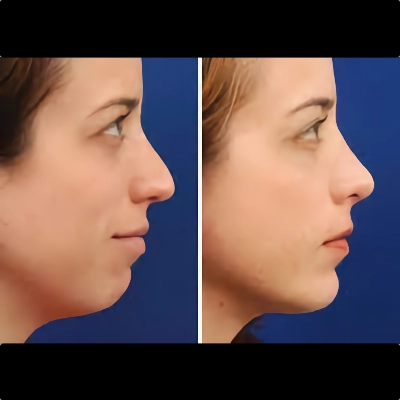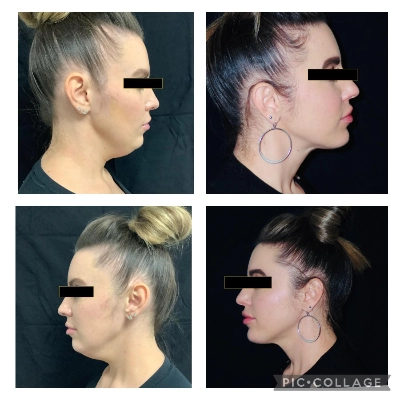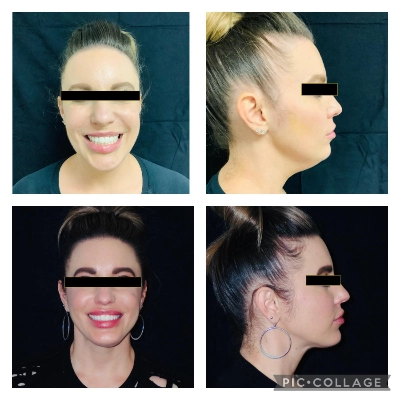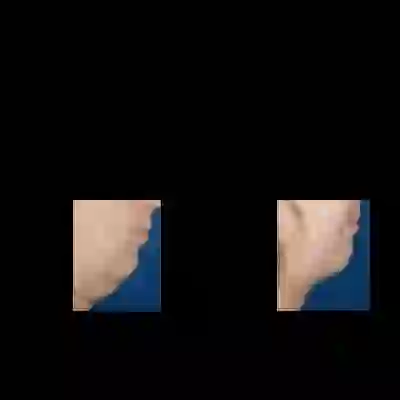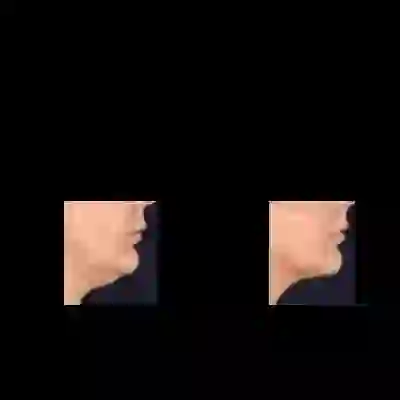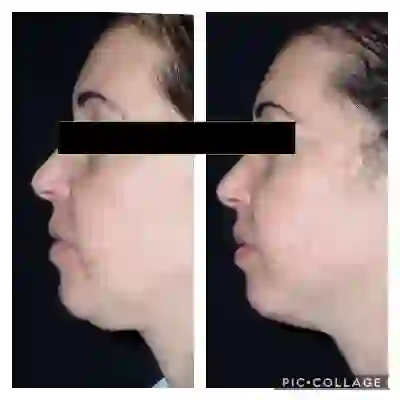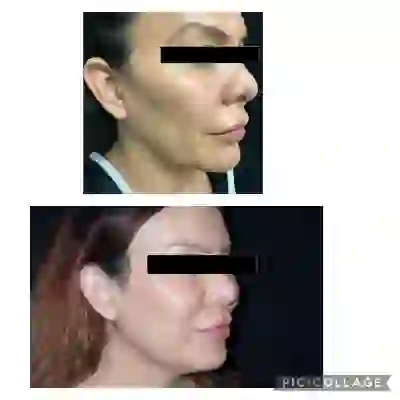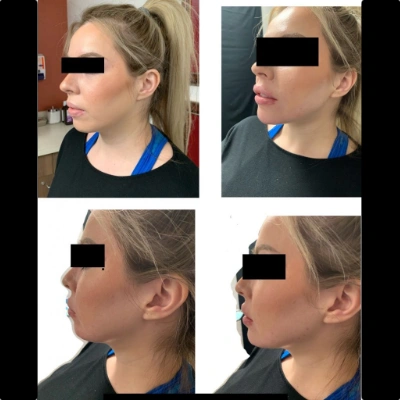
WHAT AREFOREHEAD WRINKLES?
Forehead Wrinkles are horizontal lines across your forehead that occur when raising your eyebrows.Forehead Wrinkles are used to convey feelings and human emotions such as fear, surprise, and happiness. They are also known as “Glabella Lines” for the Glabella muscle that is part of your forehead.
Your “glabella” is the skin on your forehead, between your eyebrows, and above your nose. When you make facial expressions, that skin is moved by the muscles on your forehead.
Glabellar lines (Forehead Wrinkles) appear above your eyebrows and run horizontally. Frown Lines are the vertical lines between your eyes.
As you age, your skin becomes looser. The collagen bonds that form the structure of your face become less defined. Repeated muscle movements that you make with your face can change the texture and shape of your skin. This leads to skin that appears to sag or wrinkle.
WHAT ARE THE ROOT CAUSES OFFOREHEAD WRINKLES?
Most commonlyForehead Wrinkles are a natural result of a person aging. As we age, our skin becomes thinner and the skin’s level of collagen and elastin production decreases.
Collagen is a protein that contributes to the rounded, youthful look of our skin. Without the Collagen protein scaffolding, our skin will sag, appear thinner, and wrinkles become deeper.
Elastin contributes to the skin’s ability to recover from being stretched and compressed. As elastin production declines with aging, wrinkles develop.
Decreased levels of these proteins make the skin more susceptible to sagging and the development of lines and wrinkles. Lifestyle and environmental factors such as sun exposure, pollutants, lack of hydration, or inadequate nutrition can also contribute to a loss of collagen and elastin.
Forehead Wrinkles can be one of the early signs of facial aging, asForehead Wrinkles can begin to become visible at an early age (often mid-20’s). The reason for such early development ofForehead Wrinkles is due to the constant use of our mouth area, which experiences the loss of elasticity much faster than surrounding skin.
HOW CAN I PREVENTFOREHEAD WRINKLES?
Sadly, there is no way to preventForehead Wrinkles. Nearly everyone will getForehead Wrinkles at some time in their lifetime. However, we can take measures to reduce both the severity and depth ofForehead Wrinkles. Some effective measures to preventForehead Wrinkles include:
- Avoid Smoking: Smoke and other air pollutants can speed up the aging process by damaging collagen and elastin. Smoking causes premature skin sagging and wrinkles.
- Limit Sun Exposure: UV light is damaging to both collagen and elastin in our caces. Limit your time in the sun, and avoid tanning beds completely. If you must be outdoors for long periods of time, wear UV skin protection.
- Eat Healthy: Collagen requires amino acids, vitamin C, and other minerals including zinc and sulfur. One eating healthy meals with a variety of fruits and vegetables provides these nutrients.
- Moisturize: Skin creams and moisturizers with retinol, vitamin C and hyaluronic acid can help plump skin by stimulating collagen production, which reduces the appearance of wrinkles and fine lines in our face.
- Exercise: Body movement increases the heart rate, circulates blood and nutrients, and keeps skin oxygenated. This movement increases collagen production for a glowing, youthful look.
WHAT ARE MYFOREHEAD WRINKLES TREATMENT OPTIONS?
Forehead Wrinkles are not physically harmful but can be mentally unpleasing. There are multiple cosmetic treatment options that may reduce or eliminate their appearance, including the following:
1. Botox
Botox smoothsForehead Wrinkles wrinkles that result from repetitive muscle constriction by paralyzing the muscles that form the wrinkles. Botox is a safe and effective treatment that is temporary but very effective in those between the ages of 30-50 whose wrinkles are just beginning to appear. Botox treatments last anywhere from 3-6 months and additional period maintenance sessions can maintain results over a longer period.
2. Dermal Fillers
Dermal Fillers are effective forForehead Wrinkles that appear even when the face is relaxed. Dermal fillers plump the skin making wrinkles much less visible. Some dermal fillers work by provoking an increase in the body’s own collagen production processes. Dermal fillers can last 3-12 months or longer, depending upon the type used.
3. Chemical Peels
Chemical Peels work by removing the outer layer of skin, which triggers a healing process. The skin that grows back is newer, younger, and smoother to the look and touch. Wrinkles diminish with a deep chemical peel, although the procedure can also be done at medium and light depths. Chemical peels last from one month to several years, depending upon the depth of the peel.
4. Laser Skin Resurfacing
Laser Skin Resurfacing works similarly to a chemical peel but is more exacting. The upper layers of skin are removed, revealing younger-looking skin. This new skin has more collagen and elastin, making it less susceptible to wrinkles. The effects of laser resurfacing last for several years.
5. Microneedling
Microneedling uses a hand-held device to create tiny punctures into your skin. These punctures trigger the release of growth hormones that increase collagen production. As the skin heals, it will become more youthful and elastic. Microneedling results last for approximately 4-6 weeks after treatment.
Each of these treatment options will reduce the appearance ofForehead Wrinkles. The optimum treatment for each patient depends on several factors including the severity, patient age, and skin type.
DOFOREHEAD WRINKLES TREATMENTS WORK?
Increased collagen production can help the skin around the priorForehead Wrinkles heal in a smoother, more even way.
WHO IS A GOOD CANDIDATE FORFOREHEAD WRINKLES TREATMENT?
Everyone’s different, but most patients come in because their Forehead Wrinkles are making them unhappy.
HOW LONG DOES AFOREHEAD WRINKLES TREATMENT LAST?
This depends on the treatment method. Most results typically last three to four months. In order to maintain smoothness where you haveForehead Wrinkles, you’ll need to see your healthcare provider for follow-up injections every few months.
HOW MUCH DOESFOREHEAD WRINKLES TREATMENT COST?
It depends mostly on where you are in the country and the type of treatment you get. Talk with us about your options.
FOREHEAD WRINKLES
BEFORE-AFTER IMAGES
FOREHEAD WRINKLES FAQ
PATIENT TESTIMONIALS
FOREHEAD WRINKLES PROCEDURE PREP
Before your treatment session, our specialist will discuss what to expect during your treatment. However, it is helpful to remember that there are a few things to take into consideration before your session:
- At least three to four days before your procedure, discontinue anti-inflammatory medications.
- One to two weeks before your procedure, discontinue any blood-thinning herbs, supplements, or vitamins.
- One to two weeks before your procedure, discontinue systematic steroids
- At least one month before your procedure, stop steroid injections
- On the day of your procedure, eat a full, healthy breakfast and be sure to drink plenty of water
- Please be advised that if you take chronic oral steroids, a discontinuation plan will need to be discussed with your primary care provider as abrupt stoppage may cause side effects.
FOREHEAD WRINKLES AFTERCARE
After your treatment session, we recommend that all patients rest on the day of their procedure. We advise limited use of the treatment area for the next two days, but some movement is encouraged. Limited use helps the joint recover as the treatment is absorbed by the area’s surrounding tissues.
0 – 3 days post-procedure guidelines.
- After your treatment, there is a chance you’ll experience some mild to moderate pain or discomfort at the treatment site. Discomfort is normal, and it is a sign that your body is healing as it adjusts to the treatment.
- It is best to stay hydrated and drink plenty of water to help promote healing.
- You mustn’t take ANY medications following your procedure unless specifically directed otherwise by a physician. NO medicine is a must because any drug can affect the healing process or other adverse effects.
Therefore, discontinue use of any of these medications post-procedure for best results:
- Anti-inflammatory medications for at least two weeks post-procedure
- Blood-thinning herbs, supplements, or vitamins for 3-4 days post-procedure
- Systematic steroids for two weeks post-procedure
- Other important guidelines to follow after your procedure are:
- Avoid applying ice or heat to the injection site for the first 72 hours post-procedure
- Don’t take a hot bath or go to a sauna for the first few days post-procedure
- Avoid consumption of any alcoholic beverages for the first week post-procedure
- Avoid showering for the first 24 hours following your procedure
- Limit caffeine consumption for the first week post-procedure
- Avoid smoking
3 – 14 days post-procedure guidelines.
- At this point in your healing, you should gradually increase your daily activities
- 3 to 14 days is also when you can begin exercises. Proper exercise is a vital part of long-term results, and we can help you determine which exercises are best suited for your needs before your procedure.
- Ice can be applied 3-4 times a day for 15-20 minutes as needed for comfort
- Anti-inflammatory medications (such as Tylenol) can be taken to help manage any residual pain at this time, take as directed
- Continue to avoid alcoholic beverages, smoking, or excessive amounts of caffeine
3 – 4 weeks post-procedure guidelines.
- We highly encourage you to begin physical therapy to aid in your long-term healing and continued recovery at this point in your healing.
- A follow-up appointment will be made for you to meet with our physician to review your healing process. You must keep this follow-up visit even if your recovery is going well.
- If there are any adjustments to your customized treatment plan, this is when our physician will be able to make those decisions
SCHEDULE APPOINTMENT
Registered Nurse Practitioner Tonya Tuggle is Albuquerque’s choice for those who want to keep their youthful appearance and healthy glow. Tonya is passionate about educating patients on preventative skin care and providing non-surgical maintenance for graceful aging. We can’t wait to meet you!

